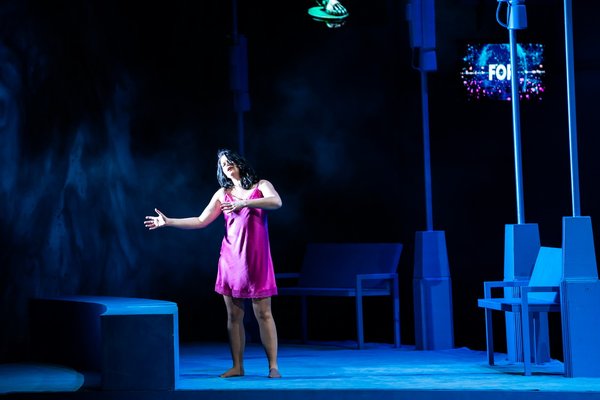
IDOMENEO, RE DI CRETA
In Brief
Opera seria in three acts, two parts, in Italian, with Hungarian, English, and Italian subtitles
The Trojan War was such an important historical event that it became one of the main motives of the past 2800 years of European cultural history; its episodes and characters inspired thousands of artists. Mozart’s Idomeneo, re di Creta tells the story of the tired king returning from the Trojan War and the people of Crete as they are life threateningly exposed to the uncontrollable forces of nature. The piece was only played once before in the OPERA, in 1979. About a quarter century had to pass before it found its way back to the Budapest Opera House’s stage, this time directed by András Almási-Tóth, who emphasizes the fight between nature and humanity in a modern context, in which a metropolis is flooded by the sea and nature devours urban life and the human space. Unless the god of sea forgives them…
Synopsis
Eight years ago, at the helm of a fleet of forty Cretan warships, Idomeneo, king of Crete, took off for the war that had been going on for two years, leaving his nine-year-old son, Idamante, behind. Through many battles he became a real hero, killing hundreds of men with his own hands, contributing to the final victory. He frequently reported on his heroics by sending prisoners of war as a gift to his people. Ilia, daughter of defeated king Priam, arrived in Crete in such a shipment but the vessel got caught in a terrible storm near the shore. Ilia was saved from drowning by the already grown son of Idomeneo, Idamante. Passion ensued between the youths. Also fleeing to Crete was Elettra after she had convinced her since passed brother, Orest, to murder their mother and her lover. Elettra longs for Idamante, even though she knows the boy faithfully awaiting his father’s return would never be hers, unless Idomeneo returned and decided the pair’s fate for them…
Act One
Ilia is torn between two feelings: her love grows stronger for Idamante, while she hates his father, Idomeneo, an enemy of her people. Idamante confesses his love for her and asks her not to judge him by the actions of his father. But Ilia, who is still a prisoner, is not yet able to declare her love. Arbace arrives with the news that the returning fleet has been shipwrecked in a storm, and Idomeneo has also drowned. Elettra is in despair, because Idamante is in love with Ilia.
The sailors on the shore pray to the gods for mercy. As soon as the sea calms down, Idomeneo also appears, whose life was spared by the sea god Neptune after the king had sworn to sacrifice the first person that fate throws his way. Suddenly, the victim appears, who happens to be none other than his own son, and who, on hearing the news of his father’s death, has come to the beach to find solitude. Frightened that he will have to sacrifice his son, Idomeneo does not reveal his identity at first. When he finally does, Idamante does not understand why his father pushes him away so harshly.
Act Two
Idomeneo turns to Arbace for advice how to save Idamante from the sacrifice. They agree to banish him from the island: he must accompany Elettra back to Argos, where she can take the throne, while they think of another solution to appease Neptune.
Elettra is happy to learn that Idamante will accompany her, this was she might win back the heart of the man Ilia, her rival stole from her.
At the harbour, before departure, Elettra and the people of Crete praise the calm sea, and Idomeneo dismisses his son. Unaware of his father's oath, Idamante remains baffled by the cruel treatment, but he is ready to leave with Elettra. Before they can set sail, an epidemic breaks out coming with a storm from the sea.
Act Three
Ilia hopes that the wind will carry her message of love to her beloved. When Idamante announces he is ready to die, Ilia openly confesses her love. Idomeneo and Elettra find them together, and the king, still unable to reveal his reasons, orders his son again to leave Crete. Idamante resolves to go. Arbace, who watches the demise of Crete helplessly, informs the king of the will of the people to deliver them from the plague.
Idomeneo knows that he must act. Idamante demands that the sacrifice proceed, only then can Crete become a land of peace again. Ilia volunteers to take his place. As Idomeneo is ready to sacrifice his son, Neptune's voice thunders: Idomeneo must step aside and hand over the throne to Idamante and Ilia. Only then will the gods be reconciled. Everyone rejoices apart from Elettra, who expects salvation from the fires of the underworld. Idomeneo renounces the throne and gives his blessing to the union of his son and the Trojan princess.
Gallery
Reviews
"The director, along with his design and choreographic team, create a society struck by a sickness when their King, Idomeneo, cannot deliver on his promise to kill the first person he encounters after Neptune rescues him from a shipwreck. The vaguely contemporised Art Deco set is strewn with video screens encouraging the public to “test today, live longer”, even offering “cheap body parts recycled”. Parallels with our own pandemic times are clear."
Gianmarco Segato, Bachtrack
